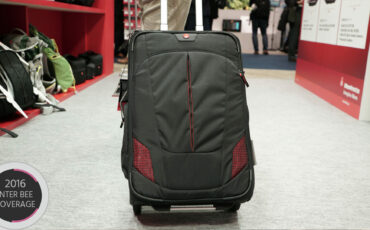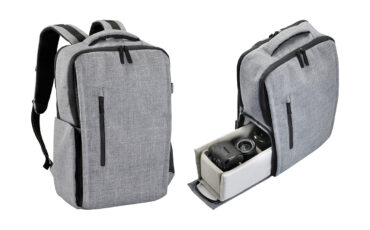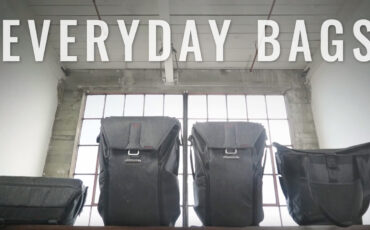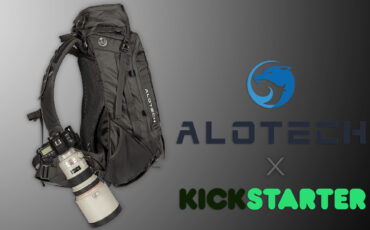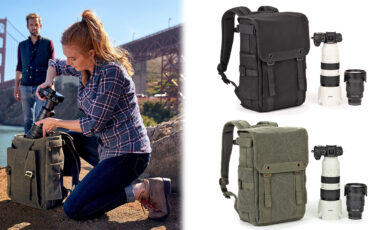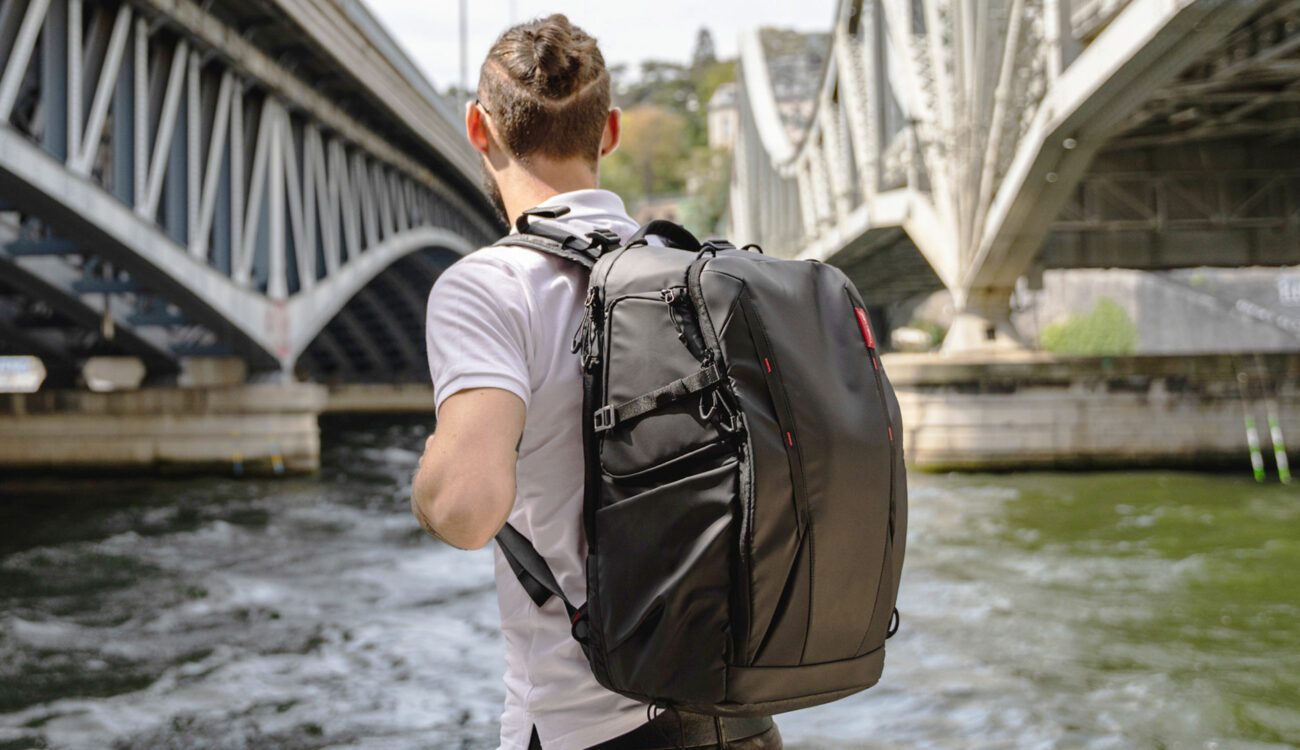
The PGYTECH OneMo is a 25/30L backpack designed for content creators looking to carry their DSLR/Mirrorless camera, lenses, and drone. After over two months of use, here is my review of this “close-to-perfect” affordable bag.
Disclaimer: Let me first say that I am not a PGYTECH Ambassador. Like every other article on CineD, PGYTECH, or any other brand, did not pay me to write this article. However, the company sent me the product to review for free. This review is my unbiased opinion, as PGYTECH did not modify, influence, or gave input about the article or video prior to its publication.
PGYTECH OneMo Backpack – From Kickstarter to the Market
PGYTECH is a young Chinese company specialized in third-party accessories for drones, action cameras, and gimbals. We already covered their filters for the DJI Mavic Air 2 (check our article by clicking here).
The PGYTECH OneMo backpack is the company’s first attempt in the cases/backpack world. Initially, the OneMo is a product born on Kickstarter in October 2019. After a very successful campaign, the bag is now available for purchase in the market.
When PGYTECH offered me to review the OneMo, I was interested to see if this top seller backpack on B&H lived to my expectations.
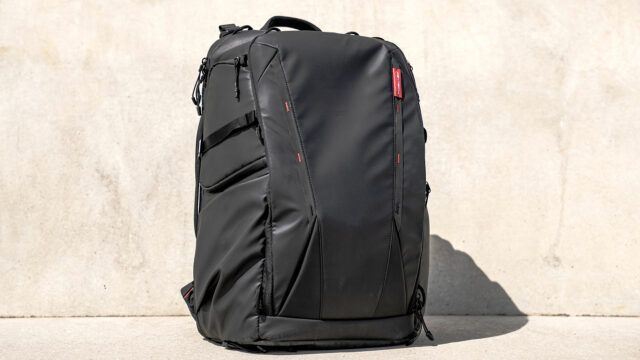
PGYTECH OneMo Backpack – External Size and Materials
First, let’s start with the external size of the PGYTECH OneMo backpack. It measures 48 x 32 x 23cm / 18.9 x 12.6 x 9″. It means that it’ll be fine as a carry-on item if you’re often traveling by plane.
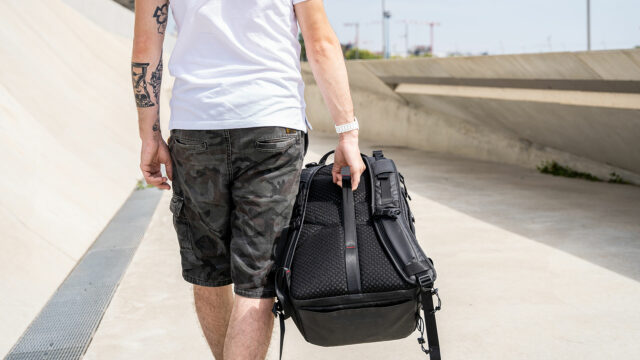
A nice touch at the back of the bag is a little strap so you can slide the OneMo over the handle of another rolling suitcase. You can also use this strap to switch the bag in “handbag mode.” There is another handle at the top of the bag, and one on the left side to grab it quickly. I like it.
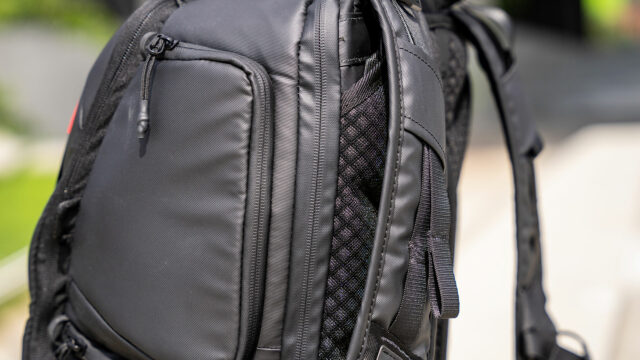
The bag’s exterior fabric is a mix between polyester (85%) and polyurethane (15%). To the touch, it looks a little like faux-leather/vinyl. According to PGYTECH, this material is “scratch and tear-resistant,” but it feels like you can rip it off if you are not careful. However, I did not have any problems with it during the two months of using the bag, and I’ve not been very gentle with it. The exterior fabric cleans easily and holds up well.
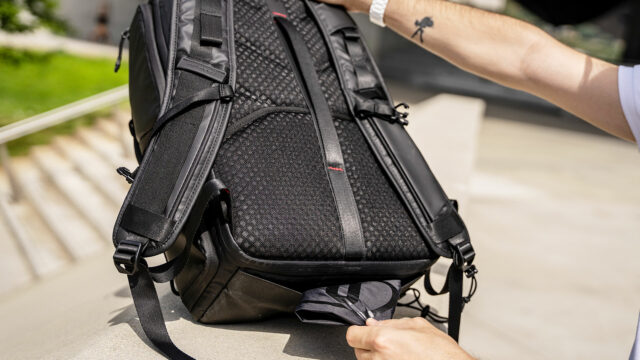
When it comes to “weather sealing”, the bag is water-resistant, and it works well for a small downpour. Also, zippers are waterproof.
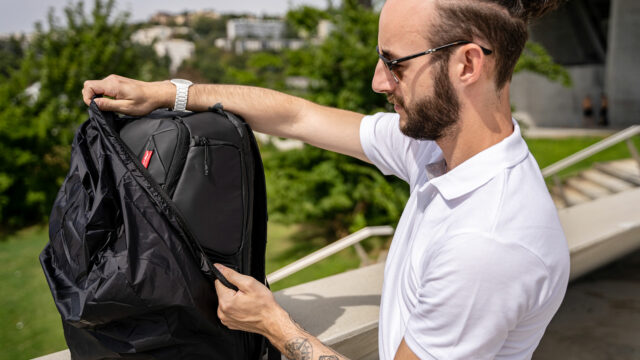
For heavy rains, the OneMo comes with a rain cover located at the bottom of the bag.
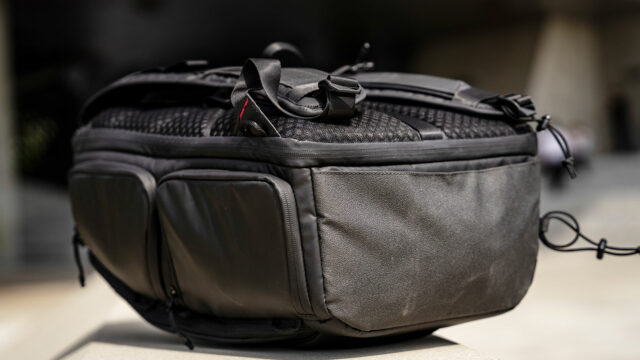
The bottom of the bag is made of a different, more rugged material. You can tell by all those little details that the designers spent additional time working on the PGYTECH OneMo backpack.
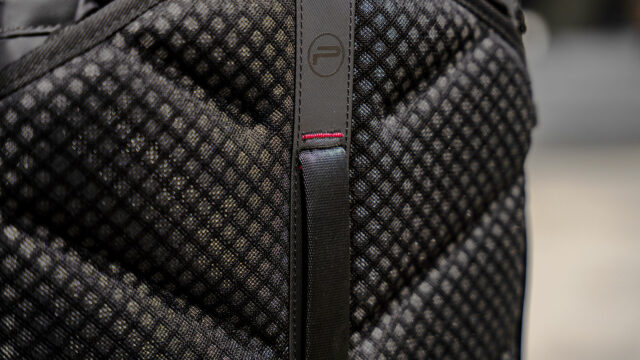
The back of the bag and the interior of the shoulder straps are made out of a soft cushion with a mesh design and air tunnels. The padding is quite firm, but it is comfortable enough to carry the OneMo for hours. The bag (with the built-in pouch/shoulder bag) weighs 2.5kg/4.4lbs, which is reasonable, but it can quickly become heavy depending on what you carry inside.
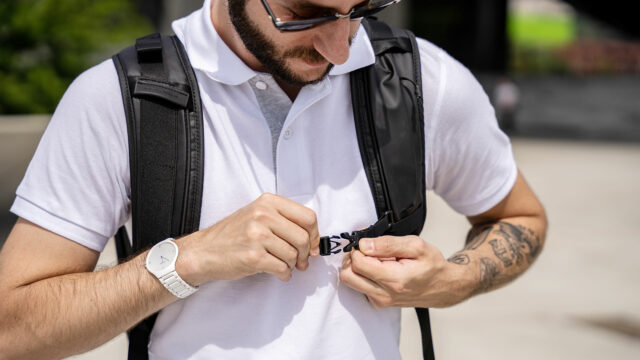
There is a sternum strap to secure the bag more securely. The sternum strap should fit you no matter your size because you can adjust the height of the belt easily by sliding it on the shoulder strap. The OneMo backpack comes with two additional and removal waist straps, but I never use them on any bag.
Finally, all the stitchings of the bag look like well made. The sewing thread PGYTECH used is thick, robust, and of good quality.
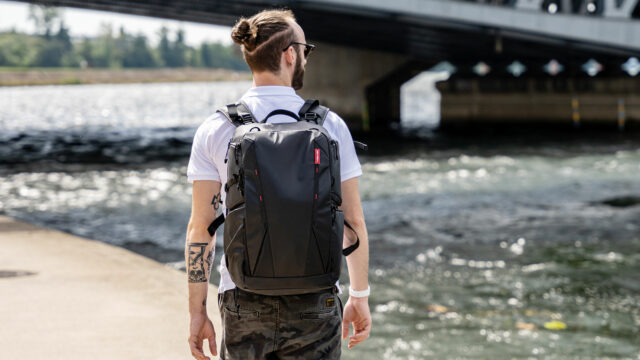
PGYTECH OneMo Backpack – Exterior Pockets and Design
On the outside, the PGYTECH OneMo Backpack features three pockets, plus one on the shoulder strap.
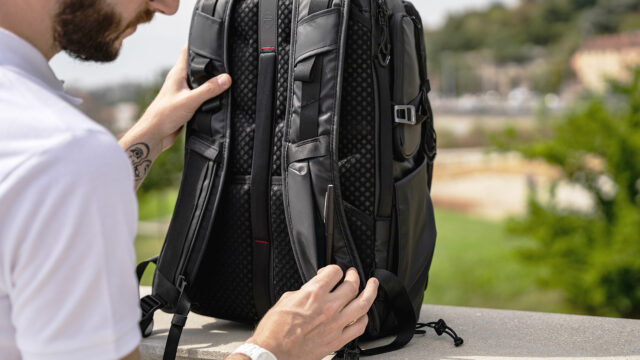
Let’s start by talking about the smallest pouch on the shoulder strap. It measures around 19 x 4.5cm/7.5 x 1.7″ and is not very deep.
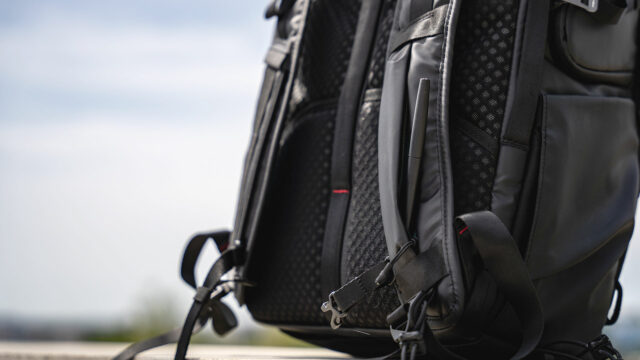
You can use it to store pens or a snack bar, but that’s it. Let’s move to more “regular” pockets.
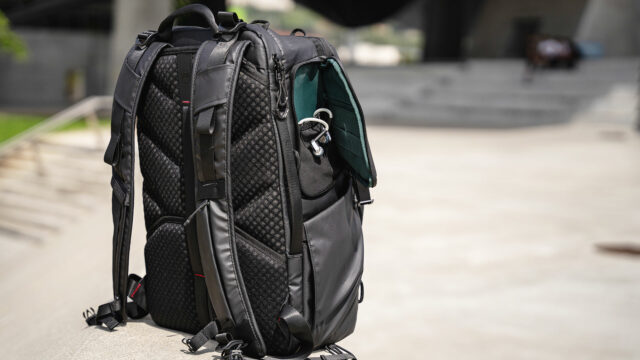
On the left side (when the bag is facing you) there is a first pocket that measures around 18 x 14cm /7 x 5.5″.
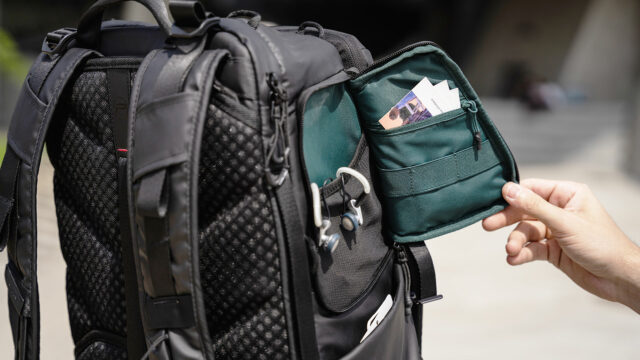
Once you open it, there is a mesh pocket on the inside that you can use to store pens and business cards. On the opening side, there is another small pocket with a zipper and three little curls.
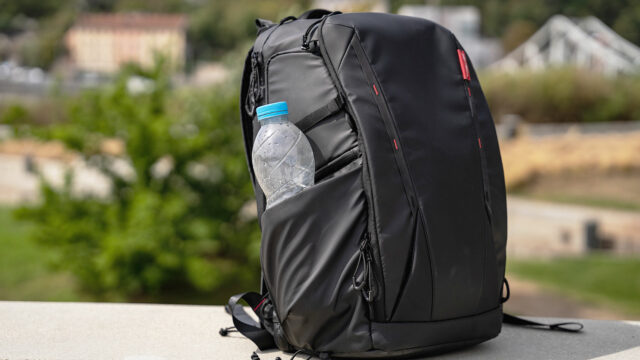
Under this pocket, there is a little extendable tripod/bottle pouch. In my opinion, this pouch could be larger so it could fit bigger tripods. It works okay for small photo travel tripods, but it’s not wide enough for filmmaking tripods. The maximum tripod’s diameter it can take is 90mm.
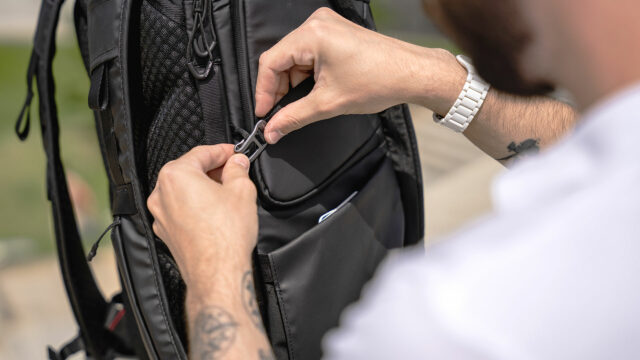
To give you an idea, I’ve been able to carry my small ZEAPON Micro 2 slider inside this pocket, but that’s the maximum it can take. If you put something in that tripod/bottle pouch, there is a useful strap over the top left pocket to secure your gear to the bag firmly.
However, there is another way to carry your tripod. You can put it on top of the OneMo and secure it via two included removable straps, but I’ve not tried it.
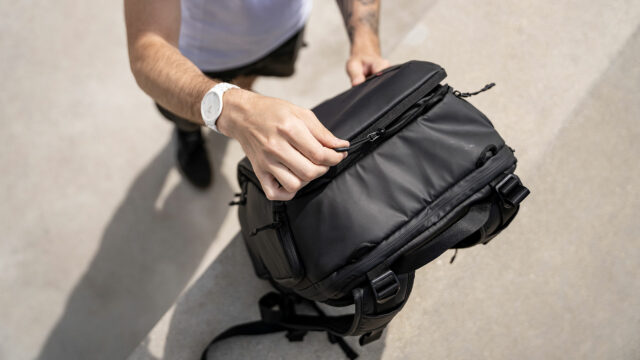
Last but not least, there is a large pocket on the front of the bag. This pocket is flat when you fully close the first zipper.
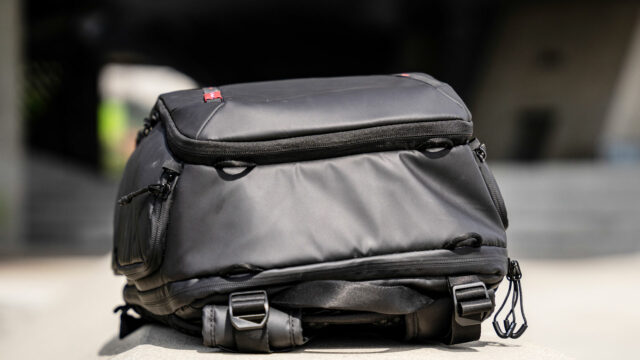
Once you open it, the pocket extends, and you gain an extra carrying capacity of 5L. I have to admit that except papers, it is hard to store anything else when it’s fully closed because it closes tightly.
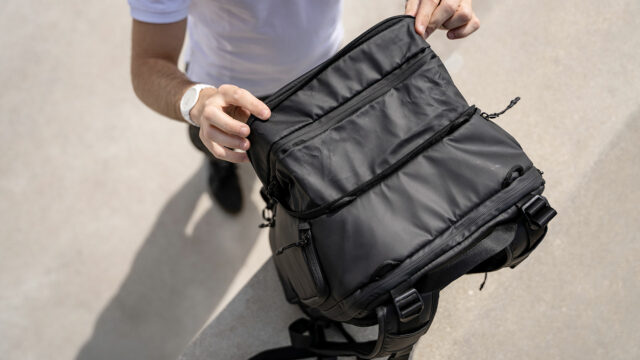
This pocket is around 25cm/9.8″ wide, 44cm/17.3″ high, and close to 14cm/5.5″ deep when fully extended. Keep in mind that the most profound part only goes for approximately 15cm high before it starts to be narrower.
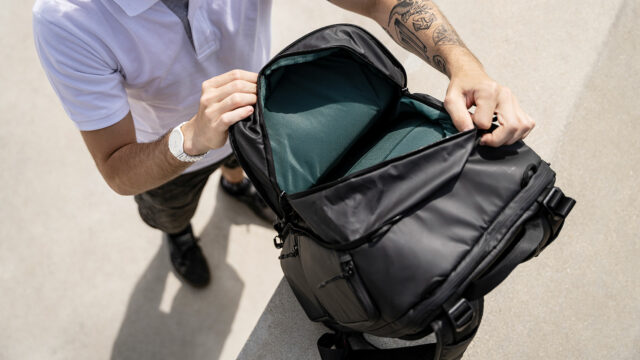
PGYTECH designed this front pocket to transport and store a handheld gimbal, like the DJI Ronin S. There is a wide strap inside this front pocket to secure your gimbal into place. I have not had the chance to test this feature, but I used this pocket to store shooting documents (call sheets, shot lists… etc.). I would have liked to have other small pockets inside to store pens, my leatherman, or any other small items.
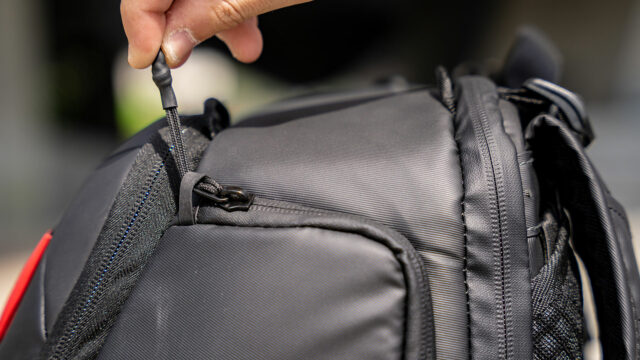
Anti-Theft Security
Before we move to the interior of the PGYTECH OneMo, something that I love is that there are “anti-theft” hooks around the pockets on the sides of the bag.
All you have to do is loop the buttons hooks through the “anti-theft” hooks, and you’re good to go. It is fast and easy to do for you and makes it harder to open your pockets for ill-intentioned persons. This is a genius and simple idea to protect your goods.
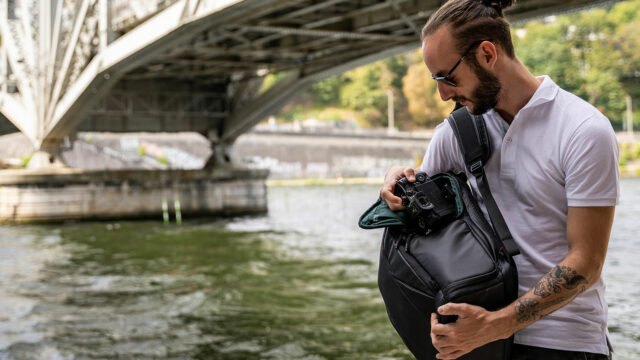
Quick-Access Pockets
On the right side of the bag, there are two other zippers, these are not pockets, but quick-access openings to the inside of the OneMo.
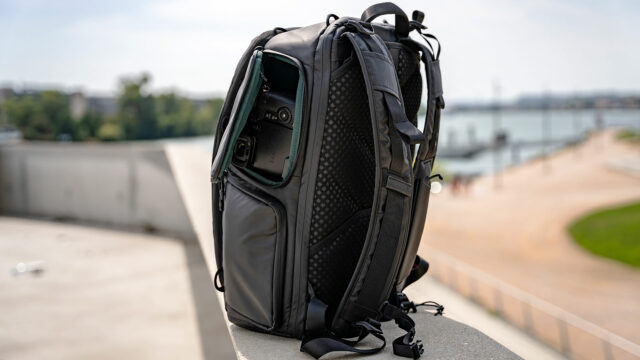
You usually find this type of openings on photo bags, but as a filmmaker, I’m not a massive fan of these. For security purposes, even if there are anti-theft hooks, I don’t feel secure with these pockets. I always put lockers on these quick-access openings and never use these. When I’m traveling with a bag on my shoulders, I don’t particularly appreciate that some people could access the interior of my bag from the sides.
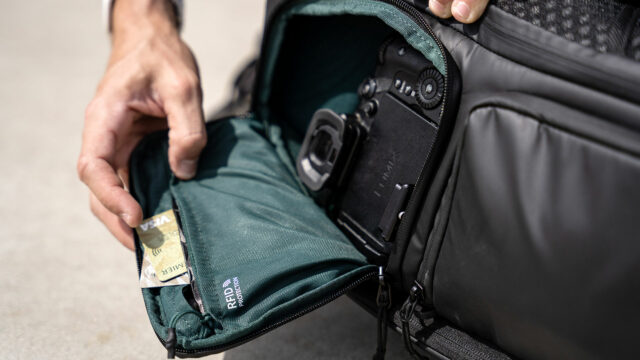
Once you open the top quick-access side opening on the right, you’ll find what PGYTECH calls an “inside safe-pocket”. This pocket measures 18cm x 8cm and is designed to hold your wallet, keys, or passport. Also, PGYTECH claims that this safe-pocket feature RFID protection, but I didn’t test that feature.
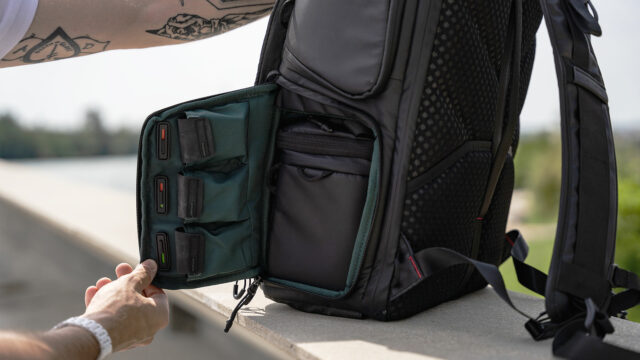
The bottom quick-access side opening measures the same as the top one. On the inside, there are three battery compartments with a charge level indicator switch. You can slide each switch between red and green to indicate the charge level of each battery slot. These pockets are a smart idea and the first time that I see this feature on a bag. Each battery compartment measures 5.5cm wide by 6.5cm height.
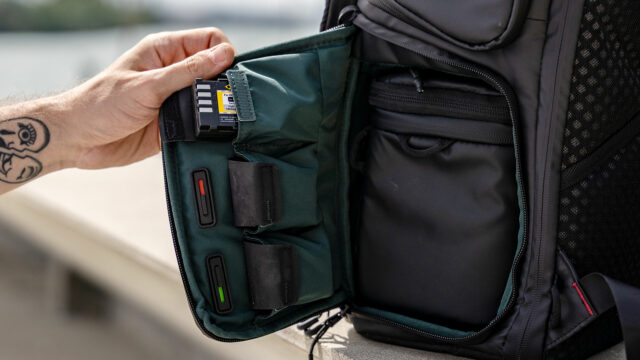
I tried it with Canon LP-E6 batteries, Panasonic DMW-BLF19 (GH5) batteries, Sony NP-F570, Sony NP-FZ batteries, which works great. I usually carry more than three batteries on my shoots, so I end up not using these battery compartments, but this is a smart idea.
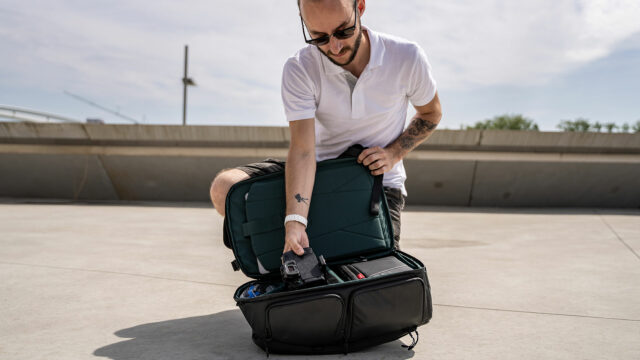
PGYTECH OneMo Backpack – Interior Design
The PGYTECH OneMo Backpack opens by the back with a large zipper all around it.
On the inside, you have access to a 25L carrying capacity. If you do the math, with the 5L expandable pocket on the front, you have a total carrying capacity of 30L. In terms of size, the interior compartment measures 43 x 30 x 15cm/16.9 x 11.8 x 5.9″.
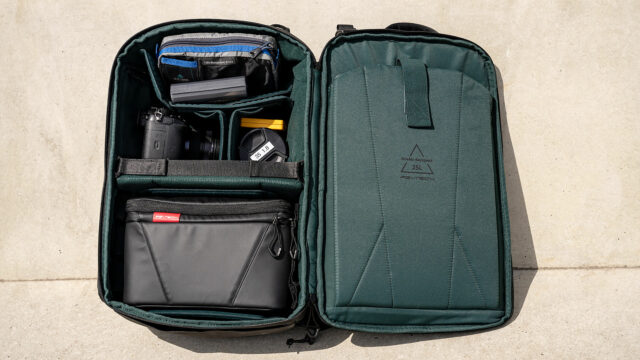
Out of the box, the interior consists of two parts: a storage part with removable dividers, and an included removable shoulder bag (more on that later).
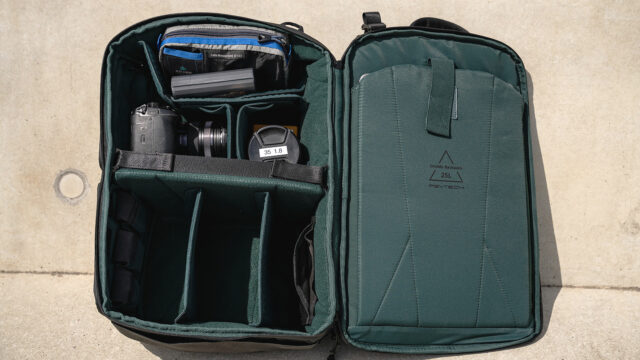
If you remove the shoulder bag, you have access to the maximum storage capacity on the inside. The OneMo comes with eight dividers from various sizes, one small storage bag, and the two waist strap plus two binding straps that I mentioned previously.
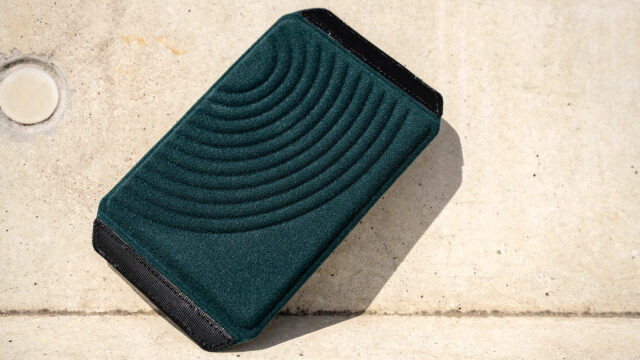
There is soft padding on three sides of the interior plus at the bottom. The filling is not very dense/thick compared to other bags I have. However, they are sturdy and don’t bend easily. To me, this is a good and bad thing at the same time. It takes less space inside the OneMo, but your gear is more prone to suffer an impact if the bag takes a huge impact.
You can put the velcro padded inserts on all the three padded sides. The right side of the bag with the quick-access side pockets does not have padding.
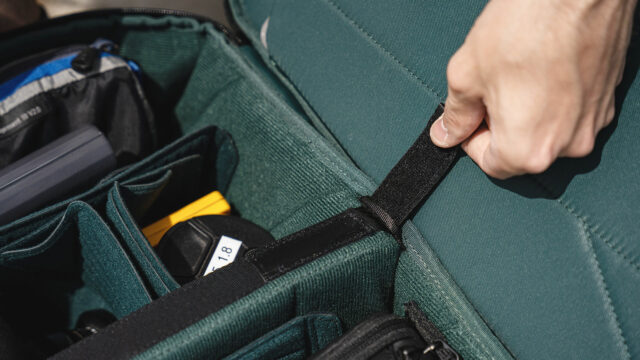
In the middle of the main compartment, there is a divider that takes the bag’s entire width. This divider is velcroed to the left side and bottom. Also, there are two hooks on each side of the main compartment to firmly secure this divider, even under heavy payload.
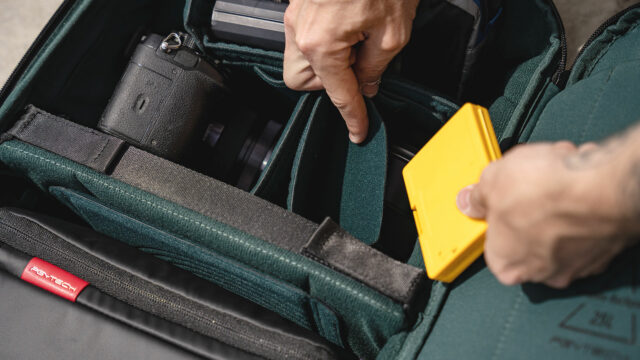
The PGYTECH OneMo comes with two dividers that feature a folding middle section. These partitions are useful to maximize the inside storage if you have small items/lenses.
Overall, the interior design and quality are impressive, and you should be able to configure the internal dividers to suit nearly every configuration.
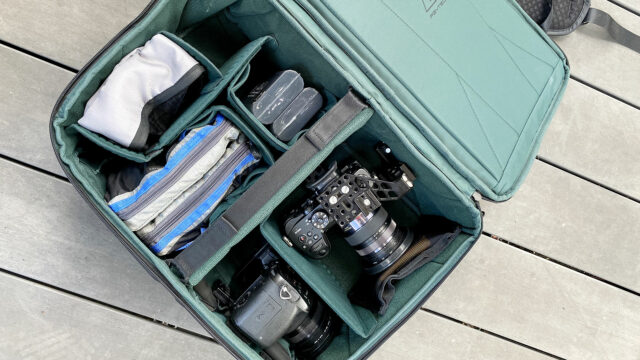
PGYTECH OneMo Backpack – Storage Capacity
In terms of storage capacity, I would say that the PGYTECH OneMo backpack is correct. If you’re a DSLR/Mirrorless camera shooter, the bag can take two cameras, two wireless microphones, one or two extra lenses, a couple of batteries, memory cards… etc. I found that the interior design was lacking interior pockets. Usually, I carry a lot of small parts like extra screws, batteries, memory cards, headphones, adapters, and so on. I like to have some tiny pockets on the inside of a bag to store and organize this type of items without using third-party pouches.
Also, I found out that the “quick access pockets” – the one with the battery compartments and the RFID protected pocket – are getting in the way. For example, when you store a camera body next to this battery compartment, getting your camera in and out of the bag is not smooth and you end up hitting these battery pockets. It’s the same for the RFID pocket, if it’s loaded with personnel gear, you loose space inside the bag.
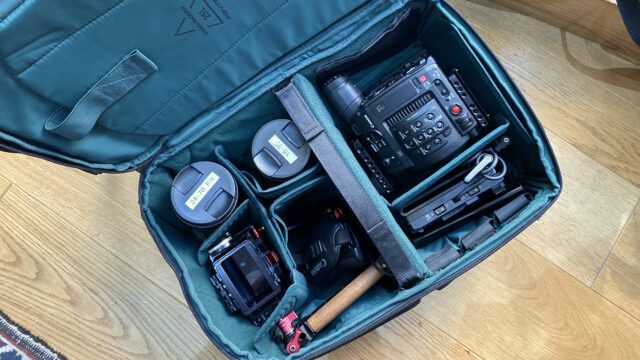
When it comes to larger than mirrorless cameras, I’ve been able to fit my Canon C200 (with top plate and baseplate attached) at the bottom of the bag, while the top part could fit two lenses, the top and side handles, the built-in monitor and some batteries. For cinema camera users, the PGYTECH OneMo backpack works, but you don’t have ton of space left for extra accessories.
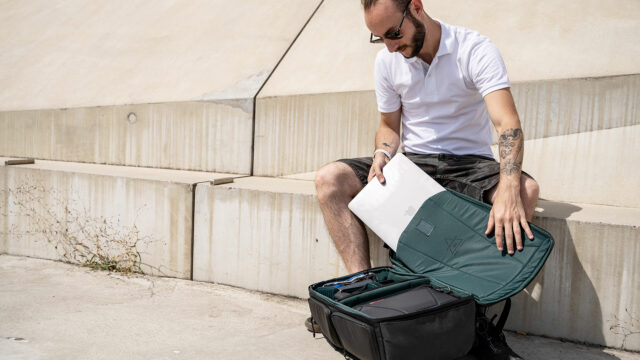
Laptop Compartment
The back of the PGYTECH OneMo’s central compartment opening doubles up as a laptop/tablet pocket. It fits a 16-inch MacBook Pro nicely.
I’d prefer to have access to my laptop without having to open the back of the bag fully, but this is a personal preference. It can feel contrary to what I said previously regarding quick-access openings. However, I have a Manfrotto Pro-Light 3N1 bag with a side-loading laptop compartment, and to my opinion, it’s one of the best places to store a computer. It makes grabbing your laptop a quick process when you’re on the go or at the airport.
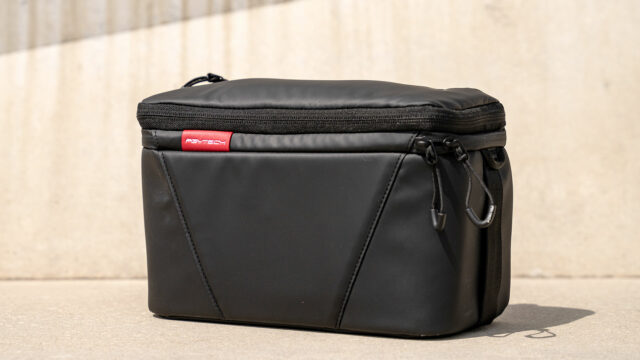
PGYTECH OneMo Built-in Pouch – Exterior
The PGYTECH OneMo comes with a built-in pouch/shoulder bag. This extra storage space is primarily made to carry your drone. However, you can also use it to store lenses, for example.
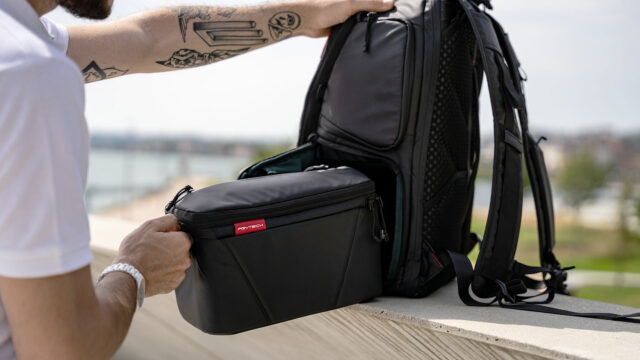
This pouch has a capacity of 5L and measures 27 x 18 x 12cm/10.6 x 7.1 x 4.7″. If you do the math, the OneMo has a total capacity of 35L if you don’t put the pouch inside the main compartment of the backpack.
The OneMo shoulder bag is made of the same material as the backpack. There is one large handle at the back of the shoulder bag, and one on the side.
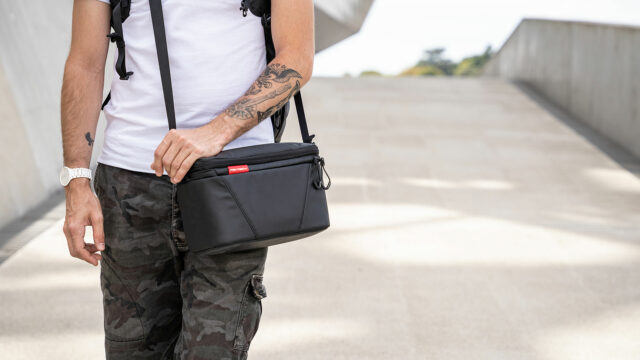
Also, there are four hooks – two at the back, two on the sides – to attach the included carrying strap, but you can also use the back hooks to secure the shoulder bag to your backpack.
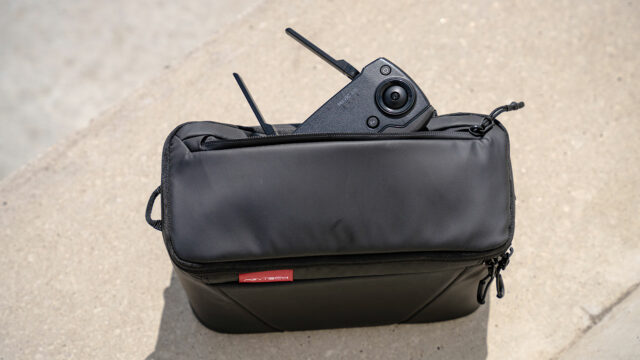
There is one pocket on top of the OneMo shoulder that is 23cm/9″ wide and 11cm/4.3″ long. It is not deep, but you can easily store extra propellers for your drone inside, or your drone’s remote controller, for example.
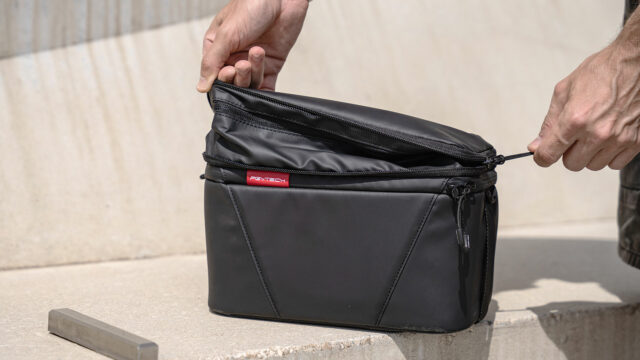
Below it, you’ll find a zipper that wraps all around the bag. If you unzip it, you’ll find an expandable pouch. There are two other zippers to open this pouch.
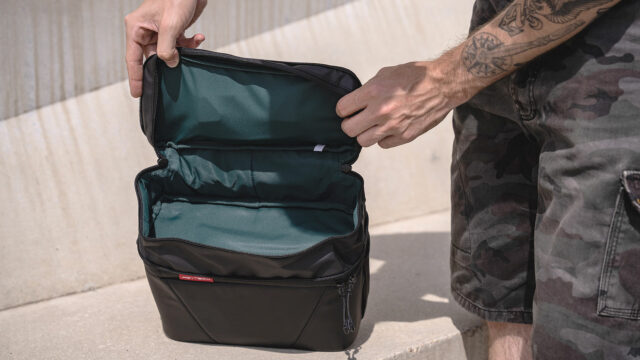
This extra storage compartment is 27 x 11 x 12cm/10.6 x 4.3 x 4.7″. There is nothing special on the inside, but this additional space is great if you need it.
Finally, there is another zipper below to open the main compartment. I don’t understand why the “anti-theft” hooks are not present in this shoulder bag; it would’ve been a great addition.
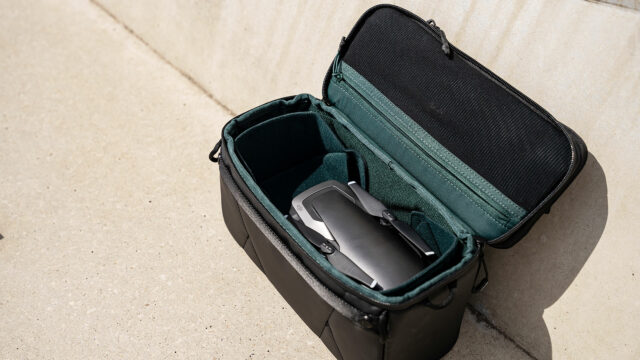
PGYTECH OneMo Built-in Pouch – Interior
Once you open the built-in pouch, you’ll see a meshed storage compartment on the flap. This mesh pouch measures 27 x 9.5cm/10.6 x 3.7″ and is perfect for storing the cables of your drone, filters, or a microfiber cloth.
Now let’s move to the 26 x 15 x 11.5cm/10.2 x 5.9 x 4.5″ main compartment. The interior material and padding are the same as the ones found in the backpack, but you can velcro dividers on all sides.
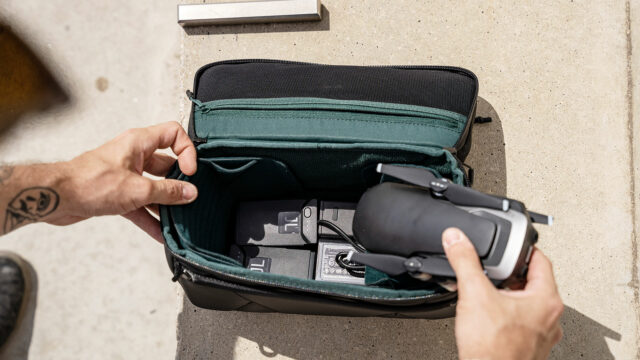
The PGYTECH OneMo built-in pouch comes with two dividers that also features a folding middle section. If I want to be a bit picky, I would have liked one or two more dividers included if I want to carry lenses inside instead of my drone. However, the backpack’s dividers do fit in the built-in pouch, so you can add some if you need it.
I’ve been easily able to store my DJI Mavic Air inside with a couple of batteries. If you have a compact drone like the DJI Mavic 2 Pro, you shouldn’t have any problems too.
This built-in pouch/shoulder bag is an excellent addition to the bag, and I can see my drone living in it permanently.
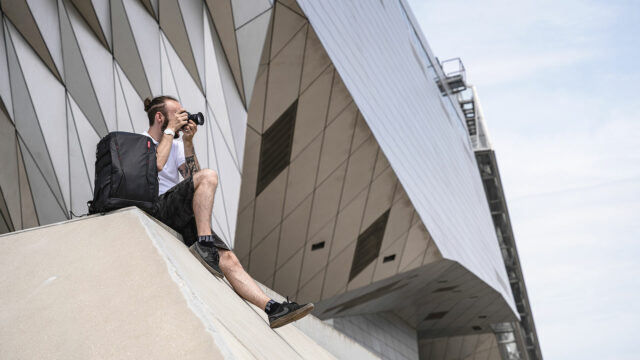
Final Thoughts
I’ve been impressed by the PGYTECH OneMo backpack from start to end. Except for small details, it is an excellent backpack option for filmmakers. The build quality is reassuring, and a lifetime warranty backs the OneMo.
It is hard for companies to create the perfect bag for everybody because all filmmakers have different needs and preferences. One of the most significant changes I’d love to see in the next version would be to add more pockets on the inside by relocating the laptop pocket on the outside. But, except for the little things that I already mentioned previously, I don’t see any major design flaws with the PGYTECH OneMo.
However, due to its capacity, I think it is a better purchase for DSLR/Mirrorless camera shooters than owners of cameras in the size of Canon C200 and such. Those might have more significant storage needs. Also, I would suggest PGYTECH to consider making a larger version – 55 x 35 x 23cm/22 x 14 x 9″, for example, (current US airplane carry-on maximum size), to further optimize what filmmakers can take with them while traveling.
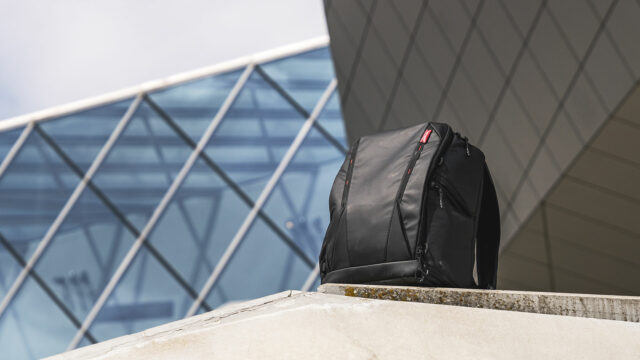
Pricing and Availability
The PGYTECH OneMo is available now for $199.00 in Twilight Black color (featured in this review) or in Olivine Camo for $219.00.
At this price-point, I think that the OneMo is a good value for money if you are a DSLR/Mirrorless camera shooter. If you want to learn more about the OneMo, please visit PGYTECH’s website here.
I’d personally want to thank Julien Strai for all the pictures of this article.
What do you think about the PGYTECH OneMo backpack? What bag do you use to carry your equipment? Don’t hesitate to let us know in the comments below!
